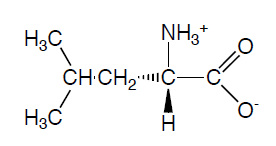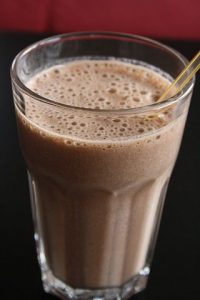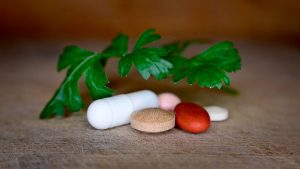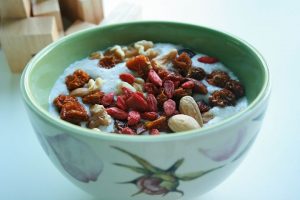Many people think you have to eat meat in order to get enough protein to build or maintain muscle mass, but that’s a myth that needs busting. While it’s true that protein from meat is one of the most common components in athletes’ diets, it is not the only way to get it. Before any carnivores start posting hateful comments, the purpose of this article isn’t to convince anyone to go veg. Instead, the focus is to give people options. After all, there truly is such a thing as too much meat in a diet. Excessive protein can cause kidney stones and too much dietary protein can also result in weight gain, excess bacteria and yeast, and can even fuel cancer growth, according to Dr. Mercola.
Dr. M also points out, however, that completely eliminating animal-based protein can lead to health problems, too, and even the great and powerful Schwarzenegger touts a reduced-meat diet these days. So! Apparently, our Moderation Mantra is being recognized by more and more people. In lieu of lean meat, here are some guidelines for getting protein from alternative sources.
How Much Protein do You Need?

In addition to protein, supplement each meal with the amino acid leucine. Image by Bioreg images/flickr
Fitness trainers recommend that you get about 1/2 of a gram of protein for each pound of bodyweight per day, and athletes and bodybuilders can take in up to .7 grams per pound without overdoing it. It’s best for your body if you divide the total amount up over all your meals in a day, ideally getting about 1/3 of your daily protein intake and supplementing 1 to 2 grams of the amino acid leucine with each meal.
Non-Meat Protein

Whey is the most common source of protein in shake supplements, but you can find ones made from soy, hemp, and even peas.
If you’re going to give meat-reduction a go, you’ll have to be open to the alternatives. Because of allergies as well as lifestyle choices, the use of some of these suggestions depends on whether you can consume dairy products. That’s because the easiest way to work protein into your diet without eating meat is to eat eggs or mix up a whey shake using skim milk. If those options are off the table, for whatever reason, pea protein and hemp protein are effective choices, and it’s easier than ever to find protein supplements made from either one.
Of course, soy is the tried and true standby, and it is a terrific option for women because of the estrogen-like benefits. However, that is also the reason men tend to steer clear of soy protein, but that’s the second myth that needs busting today. According to the Huffington Post, clinical studies have found no evidence that soy has any feminizing effects on men and because soy has been shown to decrease the risk of prostate cancer, it’s an excellent meat-alternative protein for men.
Alternative Snacking
Protein supplements aren’t the only way to get protein into your diet. Health helps out with a list of high protein foods that are easy to eat on the go such as:
- single-serve oatmeal or cottage cheese
- string cheese
- Greek yogurt
- protein bars
- single-serve hummus (perfect for dipping whole-grain crackers or carrot and celery sticks)
- almonds
- roasted chick peas
- edamame
- hard-boiled eggs
- pumpkin seeds
Quinoa, lentils, peanut butter, broccoli, and asparagus are also good sources of non-meat protein.
Take Your Supps

When you cut back on meat consumption, vitamin and mineral supplements help replace important nutrients.
Unless you have a licensed dietician structure your new reduced-meat diet, cutting back on your meat consumption will likely affect the amounts you get of some nutrients. That’s good reason to take a quality multi-vitamin. Bodybuilding.com says that people who cut meat from their diets tend to end up with deficiencies in four key nutrients, so you should at least make sure to supplement these:
- iron
- calcium
- vitamin B12
- zinc


Rmad props to you man. i was just looking at your current state photos. you got some nice triceps man, that hohrsseoe shape is really starting to show.
Good read! Alternative snacking!